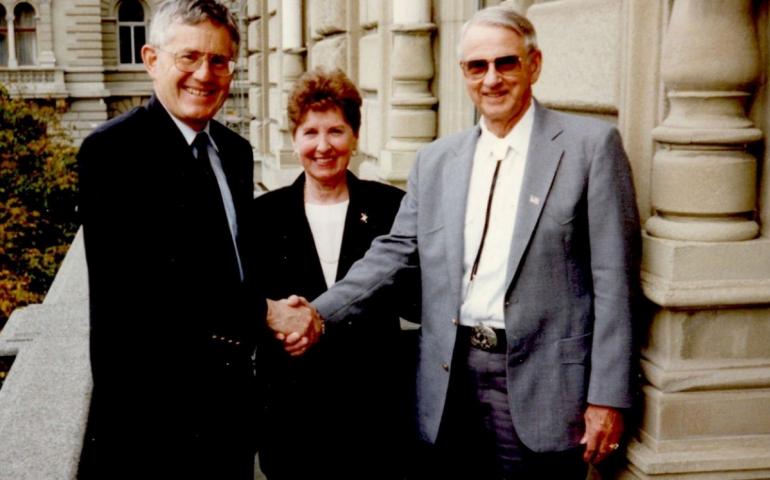
B-24 H-2-FO, Serial No. 42-7618, Nickname: Hell's Kitchen, 8th Air Force, 44th Bomb Group, 66th Squadron The B-24 bomber with the registration QK-C and the byname "Hell's Kitchen" Pilot First Lt George D. Telford and his crew were intercepted at the Swiss Border by Swiss fighter planes after a bombing mission over Friedrichshafen and accompanied to Dübendorf for emergency landing. The Swiss did not find any visible damage after the emergency landing, but the B-24 had very little fuel on board, and was later scrapped in Switzerland.
Engineer: T/Sgt Daniel L. Culler
During the Second World War, Daniel Culler spent months in a Swiss prison for violent and mentally ill criminals, where he was raped, beaten and thrown into a ditch filled with vermin and faeces. Culler managed to escape to England in 1944 via the French underground. Two years later, an intelligence officer in the US army forbade him to discuss his treatment in prison. He obeyed and internalized his nightmares and flashbacks for decades, not even confiding the details of his ordeal to his wife. But in 1990 Culler sought advice from the Veterans Administration and wrote a book about his time in prison, "Black Hole of Wauwilermoos". The book caught the attention of the military and prompted a review of his records. In 1995 he received a personal apology from the Swiss Federal Councillor Kaspar Villiger. The US Air Force honoured Culler's heroism and patriotism with two long overdue awards - the Distinguished Flying Cross and the Prisoner of War Medal. "Thanks to people like you we arre free," said Lt. Gen. James F. Record, 12th Air Force Commander at Davis-Monthan Air Force Base. Culler said the award ceremony "wiped out about 80 percent of the terrible things that had happened to me". Culler, the youngest of 10 children in a Quaker farming family in Syracuse, Indiana, was drafted into the army in 1942 at the age of 17. As a technical sergeant, flight engineer and top turret gunner, he was flying his 25th and last scheduled mission when his B-24 bomber was hit by enemy flak fire over the German-Swiss border on March 18th, 1944. After a flak grenade had set an engine on fire, Culler crawled into the narrow bomb bay to remove nearby fuel. A short time later, Swiss fighter pilots flying ME -109s forced his plane to make an emergency landing in Dübendorf, Switzerland. Culler was held in a Swiss prison before being sent to Wau-Wiler-Moos, the prison where the torture took place. For three months, the only thing that saved him from attacks by other prisoners was a single cell, contaminated by rats. In the end, he suffered from tuberculosis, broken teeth, a collapsed lung, a systemic infection and ruptured eardrums. He was transferred to a hospital in Lucerne only after a British military officer intervened on his behalf. After seven months in prison, Culler fled to France and was warned not to talk about his imprisonment. The intelligence officer said that talking about the prison could jeopardize talks to settling a so-called «erroneous» American bombing on Swiss factories producing German war equipment. "I will never understand how a person can treat other people this way, but the older I get, the clearer it becomes to me that this is happening," Culler said. After the war, Culler settled in Grand Rapids, Michigan, married and had a long career in the trucking industry. He retired in 1990 and moved to Green Valley, south of Tucson, with his wife, Betty. He never spoke to his wife about his prison sentence.
Engineer T/Sgt Daniel L. Culler later wrote books about his experiences in the US Army Air Force and Switzerland during WWII
- Prisoner of the Swiss: A World War II Airman's Story
- Black Hole of Wauwilermoos: An Airman's Story
Vol. 1 Issue 6 Summer 1996